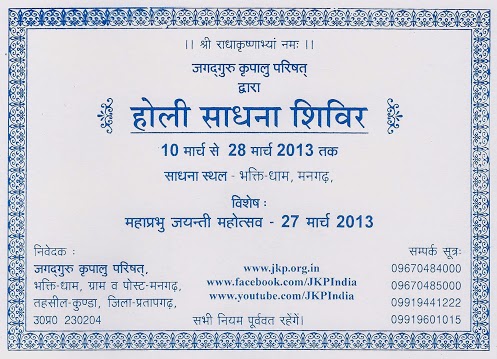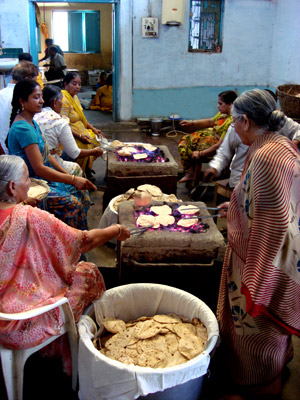Jagadguru Kripalu Parishat – India has announced the dates for the 2013 Holi Sadhana Program will be from March 10-28 in Bhakti Dham, Mangarh (India). A special program celebrating Mahaprabhu Jayanti will take place on March 27.
Posts Tagged ‘Bhakti Dham’
2013 India Holi Sadhana Program
Posted in Festivals, Upcoming Programs, tagged 2013 Holi, Bhakti Dham, Holi, Holi Celebration, Jagadguru Kripalu Ji Maharaj, Mangarh on February 15, 2013| Leave a Comment »
2012 Festival Calendar
Posted in Festival Calendar, tagged Basant Panchami, Bhakti Dham, Chaitanya Mahaprabhu, Deepawali, Divali, Dusshera, Gita Jayanti, Golok Dham, Govardhan Puja, Guru Purnima, Hariyali Teej, Holi, Jagadguru Shri Kripalu Ji Maharaj, Janmashtami, Kripalu Ji Maharaj, Naag Panchami, Radhastami, Raksha Bandhan, Ram navami, Ramnaumi, Rangeeli Mahal, Sharad Purnima, Sharat Purnima, Shyama Shyam Dham on January 27, 2012| Leave a Comment »
 The following 2012 festivals will be celebrated in all the ashrams of Jagadguru Shri Kripalu Ji Maharaj including Bhakti Dham (Mangarh, India), Rangeeli Mahal (Barsana, India), Shyama Shyam Dham (Vrindaban, India), Golok Dham (New Delhi, India):
The following 2012 festivals will be celebrated in all the ashrams of Jagadguru Shri Kripalu Ji Maharaj including Bhakti Dham (Mangarh, India), Rangeeli Mahal (Barsana, India), Shyama Shyam Dham (Vrindaban, India), Golok Dham (New Delhi, India):
28 January – Basant Panchami
8 March – Chaitanya Mahaprabhu Jayanti
9 March – Holi
1 April – Ram Navami
24 May – Akshya Tritya
1 June – Nirjala Ekadashi
3 July – Guru Purnima
22 July – Hariyali Teej
24 July – Naag Panchami
2 August – Raksha Bandhan
10 August – Shri Krishna Janmashtami
24 August – Shri Radha Ashtami
24 October – Dusshera
29 October – Sharat Purnima
13 November – Deepawali
14 November – Govardhan Puja
28 November – Kartik Purnima
23 December – Gita Jayanti
Glimpses of Bhakti Dham, Mangarh
Posted in Bhakti Dham, tagged ashram, bhakti, Bhakti Dham, Bhakti Mandir, bhakti sadhana, Indian ashram, Jagadguru Kripalu Parishat, Jagadguru Shri Kripalu Ji Maharaj, JKP, Kripalu Ji, Mangarh, sadhana program on March 3, 2010| 12 Comments »
Bhakti Dham, the first ashram of Jagadguru Kripalu Parishat, commemorates the place of Shri Maharaj Ji’s birth. Many of our hearts have been captured by the time we have spent there in devotion. Below are some recent glimpses of Bhakti Dham taken during the Holi sadhana program, including some views of the construction progress of the new sadhana hall.

Stall for purchasing audio cd's, vcd's and dvd's - an almost unlimited treasure of devotional inspiration in the form of thousands of lectures and kirtan
(1) Observe complete silence;
(2) Bring your kirtan books with you to the hall;
(3) Follow the periodic instructions that are given;
(4) While lovingly remembering God and Guru, shed selfless tears of love and sing the kirtan;
(5) When outside the sadhana hall, take Radhey name with your breath (as you inhale say Ra, as you exhale say dhey)
Maan Man, Chadu Maan Apaman-Part 3
Posted in Philosophy, Prem Ras Madira, tagged Bhagwatam, bhakti, Bhakti Dham, bliss, God, grace, guru, Hindu philosophy, hinduism, Jagadguru Shri Kripalu Ji Maharaj, Kripalu Ji, Mangarh, Prem Ras Madira, Radha Krishna, Rishabha, Saint, Saubhari Muni, yoga on February 3, 2010| Leave a Comment »
(Synopsis of a lecture given by Jagadguru Shri Kripalu Ji Maharaj on October 24, 2009, in Bhakti Dham, Mangarh, India)
We need a thorough knowledge of how we react to praise and dishonor, and then we need to put our knowledge into practice. Simply knowing this will not produce any changes. We have to practice managing them. For example, a person insults you. Don’t reply. First practice not responding. If your spouse criticises or scolds you, be quiet. Do not respond. Our habit is to respond.
One spouse says, “Why have you left this book on the pillows we sleep on? It is a holy book!” Immediately the other will respond, “Where else do you want me to put it? On my head?!” This is the kind of language we use in our relationships. Then this will escalate. One will give a response in kind, and the other will react to these outbursts until eventually their interaction will result in complete silence and both will refuse to speak to each other. Now the husband will call the son, “Pappu! Go tell you mother so and so.” His wife is sitting right next to him, but he is calling his son because he refuses to speak to her directly.
So we should see the truth of this and change ourselves because we desire what is in our ultimate self-interest and we also desire God’s grace. Such behaviour may be the key to success in the world, but it will never serve you in your spiritual life and you will get no peace.
A beggar thinks, “If only I could get two pieces of bread, I won’t want anything else.” He gets two pieces of bread. Then he thinks, “If only I had some soup and vegetables with this.” He gets that, too. Now he thinks, “If only I could get some dessert.” These desires keep on increasing. That person may even become a billionaire one day. Now the desires for celestial pleasures will arise.
So your aim of attaining happiness is not going to be fulfilled here in the material world. Make this firm decision beforehand. When you give up your desire for praise and your aversion to disrespect and dishonor, and instead feel true humility, then devotional tears will automatically begin to fall.
Even if you committed only a single sin in this lifetime, you have had uncountable lifetimes. If you do the math, this results in uncountable sins. What do we think instead? “I haven’t committed any horrible crime in this lifetime like murder. All I have done is tell a few lies. These are very ordinary sins.” The actual fact is you have committed uncountable murders and uncountable lies. You do not know this. But it is all recorded in God’s files. Accept this as an actual fact. It is in acknowledging this fact that great Saints say in the words of a devotee,
Mo sam kaun kutil khal kami.
“No one is as devious, wicked and lustful as me. Lord, if you do not forgive my past sins, it will take me an eternity to reap the consequences of my past actions.” They will never, ever come to an end. It is God’s grace that he forgives all our past deeds and that He also takes complete responsibility for our future. But He has one condition. We must surrender to Him completely and give up all our deception, craftiness, and pretense and accept the mind to be the enemy.
What have we done til now? The mind says, “It’s time for satsang but lie down and go to sleep.” Then you think, “But what if Guru Ji calls me?” You answer your own question by thinking, “I will tell him I have a backache or my head is hurting. I’ll lie.” By just giving into this whim, you have become the mind’s servant and committed a grave sin. If you had just scolded yourself then and said, “You have come to the ashram for devotional practice! You made the decision to leave your home behind for some time specifically to do this and I should listen to your suggestion to sleep just now? I have done all this my whole life. I have eaten, I have slept, I have spoken, and I have sinned according to your whims.”
The mind says, “Do this and you will become happy.” But the happiness the mind desires is the opposite of what the soul needs. The mind is a product of Maya, and the soul is a child of God. They are opposite to each other. We forget this fact.
There was an descension of God whose name was Rishabdha. Great yogic powers known as siddhis approached him in their personified form. He asked them, “Who are you? Where have you come from?” They replied, “Lord, we are the great supernatural siddhis, and we have come to serve you as you are a great devotee.” Hearing their praises, he immediately responded, “Get away from me this very instant! You will serve me?” He advises us, “Oh, humans, don’t give into the demands of the mind, even by accident.” (Bhagwatam, 5/6/3)
 There was a renunciate named Shaubhari Muni who was so evolved in his yoga practice that he performed his austerities underwater in the Yamuna River. Once, he saw two fish mating and he immediately thought, “I should get married.” He was swayed by the whims of his mind. He emerged from the water and went to Mandhata, a king who had fifty daughters.
There was a renunciate named Shaubhari Muni who was so evolved in his yoga practice that he performed his austerities underwater in the Yamuna River. Once, he saw two fish mating and he immediately thought, “I should get married.” He was swayed by the whims of his mind. He emerged from the water and went to Mandhata, a king who had fifty daughters.
Shaubhari Muni asked to marry one of King Mandhata’s daughters. The king thought, “If I give a daughter to this old man, I will go to hell because I failed in my duty as a father. But if I don’t do this, he may curse my daughters, and all fifty may become animals!” Vishwamitra had, after all, cursed the celestial maiden Menaka to become a rock. Alhalya was also cursed in a similar manner. Great ascetics have this power to curse. The king said, “I will hold a swayamvar, a ceremony in which my daughters will choose their own husbands.” The king thought, “Not one of my daughters will choose him, and I will be off the hook.”
Shaubhari understood the king’s intention, so using his yogic power, he turned his body into that of a 16-year-old youth. He was so attractive, that all fifty princesses chose him to be their husband and started fighting with each other over him. King Mandhata thought, “All I have done is bring new trouble on myself.” But Shaubhari Muni said, “It’s all right, I’ll marry all fifty of them.” With his yogic power, he created fifty bodies, and married all the princesses.
This family over time expanded to over 5,000 people, including his children, and grandchildren. One day, sitting by the Yamuna River where he first had the idea that led to his present circumstances, he woefully said, “Oh, what was I then and what am I now!”( Bhagwatam, 9/6/50) Shaubhari Muni said, “Oh humans! Witness my downfall caused by following the whims of my mind! Please be extremely careful and treat your mind as your enemy. Never consider it to be your friend.”
Understand this principle in relation to praise and dishonor and practice this diligently in your own personal lives.
© Radha Govinda Samiti and Bhakti Bliss
Maan Man, Chadu Maan Apaman-Part 2
Posted in Philosophy, Prem Ras Madira, tagged bhakti, Bhakti Dham, bhakti yoga, bliss, Diogenes, Hindu philosophy, hinduism, Jagadguru Shri Kripalu Ji Maharaj, Kripalu Ji, Mangadh, Mangarh, Prem Ras Madira, Ramakrishna Paramhansa, Swami Ram Tirtha, taka mati on February 1, 2010| Leave a Comment »
(Synopsis of a lecture given by Jagadguru Shri Kripalu Ji Maharaj on October 24, 2009, in Bhakti Dham, Mangarh, India)
So the simple fact is that as long as you are under the control of Maya, you will have every fault and these faults will remain with you in the future.
 No amount of effort, no matter how great, will free you from these. All actions originate from the mind, and the mind believes that happiness is found in the material world. After experiencing material sense objects and still not finding happiness, anger is inevitable. What is happening day and night in your home? Your father, mother, son, and spouse are all making you feel miserable. You can’t find peace anywhere. You may regularly say, “What a father I have gotten!” or “What kind of mother is this?” or “How did I get such a spouse?”
No amount of effort, no matter how great, will free you from these. All actions originate from the mind, and the mind believes that happiness is found in the material world. After experiencing material sense objects and still not finding happiness, anger is inevitable. What is happening day and night in your home? Your father, mother, son, and spouse are all making you feel miserable. You can’t find peace anywhere. You may regularly say, “What a father I have gotten!” or “What kind of mother is this?” or “How did I get such a spouse?”
But what about you? Think about yourself, also. You say, “No one listens to me. No one cares about my happiness.” But whose happiness do you care about? Just look to yourself if you want what is in your best self-interest. You are harming yourself even more by looking at others and seeing their faults.
If you thought about the fact that you are at fault, then you would be less concerned with the bad behavior of others. Someone without a nose can’t call noseless people names. Only a person who has a nose can call someone without a nose ‘noseless’. We have to fully accept what we actually are. True Saints who were beyond lust and greed openly expressed in their writings,
Mo sam kaun kutil khal kami.
“No one is as devious, wicked and lustful as me.” They wrote such words for everyone to read. But those who actually have these faults don’t want to hear even one word of this. “My neighbor called me devious! Can you imagine? Devious!”
So the desire for respect and the consequent bad feelings that arise on being disrespected are two enemies that are constantly after us. They are the reason that we do not accept God to be God nor do we accept a Saint to be a Saint. They cause us to keep on committing spiritual transgressions, and to keep on fighting with our parents, children and spouses.
We say, “My wife insulted me!” “My husband dared to call me characterless! Me!” Don’t you know that today is April Fools Day? “Oh, I didn’t realise that my husband was playing a joke on me.” But if it’s April 2 instead of April Fools, just see what kind of situation arises from those very same words. But how many women are not characterless? What does it mean to be characterless? What does it mean to be a chaste or faithful wife?
 Once a faithful wife was pounding rice with a pestle. Her husband said, “Just give me a little water.” She had just raised the pestle in the air, but on hearing her husband’s request, she removed her hand from the pestle. Miraculously the pestle remained suspended in mid-air and didn’t fall down. She gave water to her husband who drank it and then left. She returned to her work. Her neighbor saw this and asked, “Sister, where did you learn this magic?” She replied, “This isn’t magic. This is the result of being perfectly faithful to my husband.”
Once a faithful wife was pounding rice with a pestle. Her husband said, “Just give me a little water.” She had just raised the pestle in the air, but on hearing her husband’s request, she removed her hand from the pestle. Miraculously the pestle remained suspended in mid-air and didn’t fall down. She gave water to her husband who drank it and then left. She returned to her work. Her neighbor saw this and asked, “Sister, where did you learn this magic?” She replied, “This isn’t magic. This is the result of being perfectly faithful to my husband.”
The neighbor thought, “I am also faithful. I haven’t had any kind of physical relationship with any other man up to now.” When she went home she told her husband, “Look, when I raise this pestle, ask me to bring you some water.” Her husband asked, “What is this all about?” She replied, “By the power of my faithfulness, this pestle will remain suspended in the air.” Her husband was very impressed. “This is great! We could even earn money from this!” He went some distance away and said, “Bring me water.” She let go of the pestle and it fell, striking her nose. Her husband said, “What kind of faithful wife are you?”
She want to her neighbor and started fighting with her, “You have spoiled everything in my home!” Her neighbor replied, “Sister, a woman is considered a faithful wife only if she has not had even a single negative thought about her husband.” How can a woman who fights with her husband ten times a day be called faithful? Whether one is faithful to one’s Guru, one’s spouse, one’s mother or to God, this all has one meaning – the mind should not harbor even a single negative thought towards the object of one’s love.
So we have all the faults because we are under the control of Maya. If we accept this fact, we will develop humility. If we are humble, we will not desire praise and we will not feel resentful when we are reprimanded or corrected by someone. This is why the first instruction of Gauranga Mahaprabhu was to be humbler than a blade of grass and more tolerant than a tree. A blade of grass bows down when trampled upon. A tree gives its fruits and shade to everyone, even those who throw stones at it or strip it of its bark and branches.
From within, we should offer genuine respect to everyone. This should not be just an external act, such as when we say, “Sorry!” Do you genuinely feel that you have done something wrong when you say this? No, it is just an external act for the sake of etiquette. Day and night we keep on saying to others, “Sorry,” “Thank you,” and “I love you,” but this is just to fulfill our own personal self-interest.
So God and the Saints advise us to stop all this acting and get real. When you say the word ‘sorry’, feel that you have done something wrong and that you won’t do it again. If you do not feel this, and keep on saying, “Sorry!” and keep on repeating the same mistake, you will never improve. Saints have exhausted themselves and become hoarse by repeating these instructions over and over. We have heard these same guidelines repeatedly from the Vedas and other scriptures. We listen to them, but do not put them into practice, because this means we have to put in constant effort, and this goes against the wishes of the mind. For this reason, a Guru tells you that your mind is your real enemy. You have to go against it and not give in to its desires.
Swami Ram Tirtha used to be very attached to apples. To overcome this, he placed an apple before himself and kept on looking at it until it became completely rotten. He was stubborn, “I will not eat it! I will not give in to my mind!” Similarly the great Saint Ramakrishna Paramahansa, use to put dirt in one hand and money in the other and keep repeating, “Taka mati, taka mati, Money and dirt are the same.”
 Diogenes was a great Greek philosopher. He used to practice begging from a stone statue. He would say to it, “I am hungry. Give me something to eat.” People thought, “He was such an elevated ascetic, but he has gone completely mad!” Someone else thought it would not be possible for such a great soul to be mad, so he asked him, “Why are you begging for food from a stone statue?” Diogenes replied, “I know it won’t give me anything. I’m practicing not getting angry. This way when I beg at four or five homes and I receive no response, I don’t feel any resentment. I don’t feel bad and think, ‘Just look at this person! He has so much but he can’t spare two or three slices of bread’.”
Diogenes was a great Greek philosopher. He used to practice begging from a stone statue. He would say to it, “I am hungry. Give me something to eat.” People thought, “He was such an elevated ascetic, but he has gone completely mad!” Someone else thought it would not be possible for such a great soul to be mad, so he asked him, “Why are you begging for food from a stone statue?” Diogenes replied, “I know it won’t give me anything. I’m practicing not getting angry. This way when I beg at four or five homes and I receive no response, I don’t feel any resentment. I don’t feel bad and think, ‘Just look at this person! He has so much but he can’t spare two or three slices of bread’.”
Even nowadays, when a street beggar doesn’t get anything in alms he thinks, “This person is sitting in an expensive car and he can’t spare me even a few coins!” Most of them don’t say anything, but some say it out loud.
(Continued in Part 3)
© Radha Govinda Samiti and Bhakti Bliss
Maan Man, Chadu Maan Apaman-Part 1
Posted in Philosophy, Prem Ras Madira, tagged ahankar, bhajan, bhakti, Bhakti Dham, bhakti yoga, bliss, ego, Hindu philosophy, hinduism, Jagadguru Shri Kripalu Ji Maharaj, kirtan, Kripalu Ji, Maya, Prem Ras Madira, sadhana on January 30, 2010| 4 Comments »
(Synopsis of a lecture given by Jagadguru Shri Kripalu Ji Maharaj on October 24, 2009, in Bhakti Dham, Mangarh, India)
In Prem Ras Madira there is a pad, Maan Man, Chadu Maan Apamaan, “Oh mind! Accept what I say. Don’t engage in disputes over honor and insult.” Even though this is not a Vedic verse, it is very important to understand for one’s devotional practice.
There are two obstacles in our devotional path. One is maan, the desire to be respected or honored, and the other is apamaan, the aversion to being disrespected or insulted. If we understand both of these and try to control them, our devotional progress will speed up considerably.
What is maan? Our sense of pride or ego. It is our desire that others should respect and honor us. When we are praised by others we feel happy. If someone says, “You are very generous.” Externally we answer, “I am not worthy of such praise.” But internally we feel, “This person is a very good. He is speaking highly of me!” Although externally we are saying we don’t deserve praise, internally our feelings are just the opposite.
On the other hand, when someone disrespects or insults us, we lose our equanimity. We become angry, our feelings get hurt and our hearts burn from within. But why is this so? Just reflect on this when you are alone: what fault do you not possess? Name a single fault that you don’t have. From time to time you are lustful, angry, greedy, deluded, and jealous. You have animosity for others, you lie, cheat, boast, and deceive others – all to fulfill your selfish desires. Everyone does this, from the most illiterate person to the most intelligent. Why is this?
The first reason is that we are under the control of Maya. The second reason is that we desire spiritual happiness. Because we are under the control of Maya, we are ignorant. We identify ourselves with our physical bodies. Our desire for happiness is also natural, and to attain that happiness we are capable of doing anything. We will lie, cheat, and deceive even our own parents, siblings and spouses. You even do this with your own Guru, what to speak of others? Your Guru is the one from whom your greatest self-interest could be gained, but you do not even spare him.
If the Guru utters just one sentence to you, “Why did you do that?” You immediately make excuses, “Guru Ji, it is like this, it is like that…” What are you actually saying to Guru Ji in this situation? “What you are saying is incorrect! I didn’t do anything wrong.” Why do we do this?
This is due to pride. We have spent our entire lives thinking of how to make sure that no one speaks ill of us. We have accumulated knowledge and acted in such a way so that people speak well of us. We keep on asking ourselves, “What should I say to deceive that person? How can I create a good impression so I can get what I want from him?” This is all we have done. We haven’t attempted to become good, we rather only wanted to be called good. What is the use of merely being called good?
There are politicians who claim, “I am a public servant. I serve the masses.” But do they serve the public or their own pockets? They act like they are sacrificing so much because they spend millions of rupees to be elected to their posts as public servants. The moment a person is elected, all he does is try to make that one million into two million. This is the extent of his service to the public. “I work for the welfare of others!” The welfare of others? When even Indra, the king of the celestial abodes, is unable to work for the welfare of others, what will an ordinary mortal do? Everyone simply wants his own happiness, and will perform every kind of good and bad action to attain it.
So the desire for respect and honor is a very serious ailment, as is our aversion to being disrespected. If anyone should speak against us, we immediately get angry, and when that happens, our discriminative thinking comes to an end. So our aversion to disrespect is also a major obstacle in our devotion, but disrespect will always happen in the world. This being the case, how could anyone avoid being disrespected? Even God realised Saints aren’t spared being criticised. Detractors say, “He just keeps on saying ‘Hare Ram’ all day long. We have to stop him. Let’s discredit him by spreading some rumours about him.”
History bears witness to what we have done to Saints from the time of Prahlad up to the time of Meera. What has not been done to oppose Saints? But no one thinks of the harm they are causing themselves by doing this. They just end up destroying themselves. Their precious human birth is taken away from them because of these serious spiritual transgressions.
So the simple fact is that as long as you are under the control of Maya, you will have every fault and these faults will remain with you in the future.
(Continued in Part 2)
© Radha Govinda Samiti and Bhakti Bliss
Relationship of God and Guru-Part 2
Posted in Philosophy, Radha Govinda Geet, tagged Bhagavad Gita, Bhagwatam, bhakti, Bhakti Dham, bliss, devotion, God realization, grace, guru, Hindu philosophy, Jagadguru Shri Kripalu Ji Maharaj, Kripalu Ji, Krishna, Mangarh, Ram, Ramayana, Saint on December 28, 2009| Leave a Comment »
(Continuation of a talk given by Jagadguru Shri Kripalu Ji Maharaj on December 23, 2009, in Bhakti Dham, Mangarh, explaining a new kirtan verse)
In the Ramayana, Saint Tulsidas has said,
More man prabhu as vishvasa,
Ram te adhik Ram kar dasa.
The devotee Saint of supreme God is greater than God. In the Bhagwatam, Shri Krishna says, “The one who wants to become my divine devotee by practicing devotion to Me is ignorant. The one who is a devotee of My devotee Saints is extremely dear to Me. He alone can attain My divine love. My divine love is found in the care of such a Guru.”
God comes to reside in one’s heart only after it has become completely purified. Shri Krishna says in the Gita (9/22), “Surrender completely to Me and purify your heart and then I will come.” So who is the one who will do this dirty work of purifying the minds of the souls? God tells the souls to go to His Saints. They are the ones who will clean the hearts and minds of the souls. When the drawing room of one’s heart is perfectly clean, then God will come and reside there.
So Saints do such a big job for us. First, they make the souls correctly understand spiritual philosophy, such as who is the soul, who is God, what is Maya, what is the world, what is detachment, what is attachment. If the Saint didn’t make the souls understand this, even if God were standing before them, their experience of Him would amount to nothing. This is because God is divine; we can’t see Him. He is already residing in our hearts, but what difference has this made to us? He is also omnipresent, but how are we benefiting from this?
So first the Saint will teach correct spiritual knowledge, then He will teach practical devotion to the souls. He will sit with his disciples and teach them just as a primary school teacher sits with his students to teach them the alphabet. A teacher says, “Say ‘C’.” The child says, “C”. The teacher says, “Say ‘A’.” The child says, “A”. The teacher says, “Say ‘T’.” The child says, “T.” Then the teacher says, “Now say it all together, CAT.” The child says, “TAC.” The teacher says, “No! Not TAC! Say CAT.” Then the child will say “CAT.” This is how we were taught. Everybody was like this at the beginning. How much effort our primary school teachers exerted just to teach us one single word!
So your teachers have worked very hard to educate you from this age graduate school. In the world, they receive money for doing this. Whether you come to class or drop the class, it’s all the same to them. But Saints give us such knowledge in a short amount of time which is the essence of all the scriptures, and which we couldn’t learn on our own in thousands of years of study. If not, we would forever remain confused, because there are two contradictory points of view found in every scripture.
 So the Guru gives us correct spiritual knowledge, shows us how to practice devotion, and upon the complete purification of our hearts, it is he alone who also graces us with divine love. Then our senses, mind and intellect are made divine. When a soul attains divine love, then even God Himself comes under the control of that devotee’s love.
So the Guru gives us correct spiritual knowledge, shows us how to practice devotion, and upon the complete purification of our hearts, it is he alone who also graces us with divine love. Then our senses, mind and intellect are made divine. When a soul attains divine love, then even God Himself comes under the control of that devotee’s love.
God alone is supremely independent; all others existences are dependent. But after a soul attains God realisation, this definition of God becomes reversed. Only one power is independent – the God realised Saint; all others are dependent to him, even God Himself! Due to this, Shri Krishna declares, “I walk behind My devotee Saints so that I may be blessed by their footdust and be purified.” (Bhagwatam, 11/14/16).
In this way, it is correct that God is the greatest, it is also correct that God and the Saint are one, and from the point of view of our self-interest, the Saint is greater than God. We should feel particularly grateful to him because he delivered us to God and was with us from the very beginning until the very end.
When a child is born, under her father and mother’s care she is nurtured, educated, and taught skills and virtues. When she turns 18 years of age, a boy comes to interview her as a potential marriage partner. The father did all the hard work, from her birth until her 18th year and then gave her in marriage to the boy. The daughter simply encircled the ceremonial fire during her marriage ceremony and then left her parents home. So God is our eternal relation, but it is the Saint who exerts all the hard effort for the soul and then joins him with God. For this reason it is said that the Saint is greater than God. In this way, all three statements are true.
© Radha Govinda Samiti and Bhakti Bliss
Relationship of God and Guru-Part 1
Posted in Philosophy, Radha Govinda Geet, tagged Bhagavad Gita, bhakti, Bhakti Dham, bliss, Brahma Sutra, God, guru, hinduism, Jagadguru Shri Kripalu Ji Maharaj, kirtan, Kripalu Ji, Mangarh, Ramayana, Upanishad, Vedanta, Vedas on December 27, 2009| Leave a Comment »
(Synopsis of a talk given by Jagadguru Shri Kripalu Ji Maharaj on December 23, 2009, in Bhakti Dham, Mangarh, explaining a new kirtan verse)
 In our scriptures and also in the world three kinds of situations are written about and described. In some places it is written that God is the greatest. It is also written that God and Guru are equal. It is also written that the Guru is greater than God. An ordinary person, who reads the scriptures on his own can’t understand which of these three is correct and so he becomes confused. I am now now going to reconcile these three.
In our scriptures and also in the world three kinds of situations are written about and described. In some places it is written that God is the greatest. It is also written that God and Guru are equal. It is also written that the Guru is greater than God. An ordinary person, who reads the scriptures on his own can’t understand which of these three is correct and so he becomes confused. I am now now going to reconcile these three.
These three statements are, in fact, correct. But they contradict each other – how then could they all be correct? In the scriptures it is written that God is the greatest, so this point is certainly correct (Shvetashvatara Upanishad 6/8, Gita, 11/45, Bhagwatam, 3/2/21 and 2/4/40).
All these verses say that there is no one, nor will there ever be anyone equal to God – so someone being greater than God is completely out of the question. The name for God is brahm, which means He is the greatest and He makes others great.
So the definition of God is that He is absolutely unlimited and the greatest (Taitariya Upanishad 2/1). Why is this? Listen to the reason. The Ved says that all the individual souls are parts of Him. The individual souls are a power of God. Both Maya and the souls are powers of God. Apart from these two, there is no third power that exists (Purush Sukta, 3) This same verse is also found in the Chandogya Upanishad, 3/12/6, and the Tripavibhuti Narayana Upanishad, 4/1.
So all the individual souls are parts of supreme God. A part can’t be equal to the whole. A part means a fraction. A grain of sand could never be equal to the entire earth. The Gita also explains the individual soul is a part or true fraction of God (Gita, 15/7, 9/18). The Subhal Upanishad (6/4), the Bhagwatam (3/50/38) and Ramayana declare the same.
So logically no one would even consider that a part is equal to the whole. They are opposite to each other in nature. Therefore, there is no one now, nor will there ever be, nor was there ever anyone equal to God.
But it is also said that God and Guru are equal. And when you practice devotion to God, it is said that you must practice exactly the same devotion to the Guru. The Vedas declares this (Shevtashvatar Upanishad 6/23). Why is this? Because, as the Narad Bhakti Sutra (41) says, there no difference between God and Guru. God and Guru are one (Bhagwatam, 7/15/26, 7/15/27). So the Gita, Bhagwatam, Ramayana and other scriptures, declare both are equal. How are they equal? How could a part be equal to the whole?
In actuality, they are not equal, but with God’s grace and after God realisation, God makes the individual soul equal to Him. This is definitely possible.
God has eight main divine qualities (Chhandogya Upanishad, 8/1/5). The Vedanta or Brahma Sutra has said (1/3/13-16) that God gives these eight qualities to an individual soul after God realisation. The soul even receives the quality of satya sankalpah, in other words, whatever he thinks, happens. He doesn’t have to do anything. He simply desires and it comes to pass (Chandogya Upanishad, 8/2/1-10).
Therefore, God and Guru are also equal. Whatever knowledge, bliss and eternal life God possesses, the realised soul or Saint attains forever.
There is one area in which God will remain the greatest (Brahma Sutra, 4/4/17, 21), which is creating the world, remaining seated in the hearts of all the individual souls, noting their actions and giving them the consequences of their actions, and so on. These tasks are only done by God, not by any Saint.
But why then is it said that the Guru is greater than God?
(Continued in Part 2)
© Radha Govinda Samiti and Bhakti Bliss
Chandra Sam Badhai Prem Govinda Radhey
Posted in Radha Govinda Geet, tagged bhajan, bhakti, Bhakti Dham, devotion, divine love, Hindu philosophy, Jagadguru Shri Kripalu Ji Maharaj, kirtan, Kripalu Ji Maharaj, Krishna, Radha, Radha Govinda Geet, sat-chit-ananda on November 12, 2009| Leave a Comment »
 Chandra sam barhai prem Govinda Radhey.
Chandra sam barhai prem Govinda Radhey.
Pai yamen poornima na kabahun bata dey.

(Synopsis of a talk by Jagadguru Shri Kripalu Ji Maharaj on November 2, 2009, Bhakti Dham, Mangadh, India, explaining this new kirtan verse)
The definition of love is that it should always keep on increasing every moment. The place where the flow of the Ganges River begins in the Himalayas is shaped like the mouth of a cow, so it is called “Gomukh”. It is very narrow at this point, but after this, its flow steadily increases. By the time it reaches Bengal it is extremely big and wide. Divine love is like this.
How is worldly love? It is like a river that begins with a width of fifty feet. So many small rivulets branch off from this river that eventually it becomes a small trickle. Understand this in simple language.
If you stand outside in the very early morning, your shadow is extremely long. This becomes shorter and shorter as the sun moves, until midday when you have no shadow at all. As the day progresses towards later afternoon, again your shadow grows again in the opposite direction. So worldly love is just like your shadow when it starts out long in the morning and ends at midday. This is true of any kind of love you have in the world, whether of your wife, husband, son, daughter, or even of a beautiful scene.
For example, the Taj Mahal is one of India’s most beautiful landmarks. When foreign prime ministers visit India, they visit the Taj Mahaj and praise it greatly. But if you ask the people who live in Agra (where the Taj Mahal is located), “Come on! Let’s go see the Taj Mahal!” They will say, “What for? What is there to see? I have seen it already.”
So all love in the world steadily decreases. And after this, one starts to experience sorrow from that same husband or wife. Then the insults and verbal abuse begin. God’s love on the other hand, steadily increases every moment, just like the waxing moon.
But the unusual quality of God’s love is that it never reaches the state of absolute fullness – it keeps on steadily increasing for eternity. This is the miracle of divine love.
So there is a competition that is going on between Radha, who is the form of divine love, and Krishna, who is the form of divine beauty. Radha Rani increases Her love, so Shri Krishna increases His beauty. So Radha Rani’s love increases even more, and Shri Krishna increases His beauty to match. Neither defeats the other in this competition. The bliss of Their love and beauty keeps on steadily increasing forever. This is because both Their body and Their soul is made of sat-chit-ananda. That is why this unique quality is present in their divine personalities. This is the brief meaning of this kirtan verse.
© Radha Govinda Samiti and Bhakti Bliss
Gopashtami Celebration – Bhakti Dham
Posted in Special, tagged bhakti, Bhakti Dham, bliss, Braj, Gopashtami, goshala, Hindu Festival, Jagadguru Shri Kripalu Ji Maharaj, Krishna, Mangarh, rangoli, sadhana on October 29, 2009| 2 Comments »
 A festival dedicated to Lord Krishna, Gopashtami, was celebrated on October 26 in Bhakti Dham, Mangadh, during the 2009 annual sadhana camp.
A festival dedicated to Lord Krishna, Gopashtami, was celebrated on October 26 in Bhakti Dham, Mangadh, during the 2009 annual sadhana camp.
Gopashtami or Gopa Ashtami, is observed on the eighth day during waxing phase of the moon (Shukla Paksha) in Kartik month (October – November).
These celebrations commemorate Shri Krishna’s childhood leelas related to tending cows in Braj. Traditionally on this day, cows are bathed and decorated, and “go” or cow puja, a small ceremony, is performed.

A beautiful rangoli design was made with colored powders inside the temporary cow pen

Two cows from the ashram goshala were chosen and decorated for the occasion
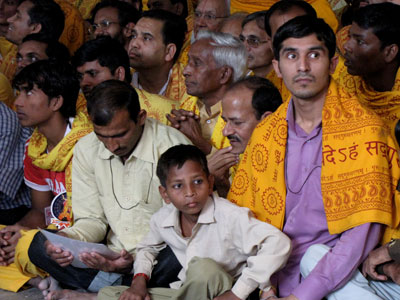
Crowd waiting for the festivities to begin
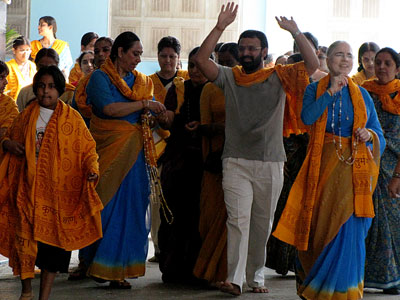
Joyous respected devotees beginning to arrive for the celebration
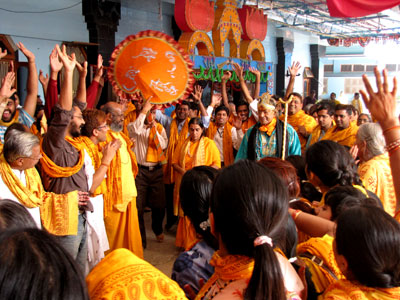
Shri Maharaj Ji graces the occasion
